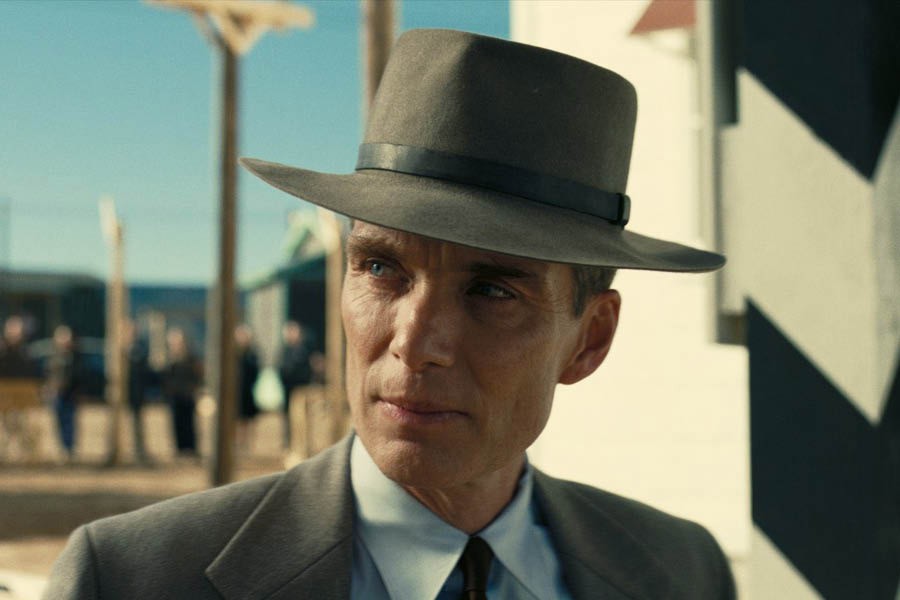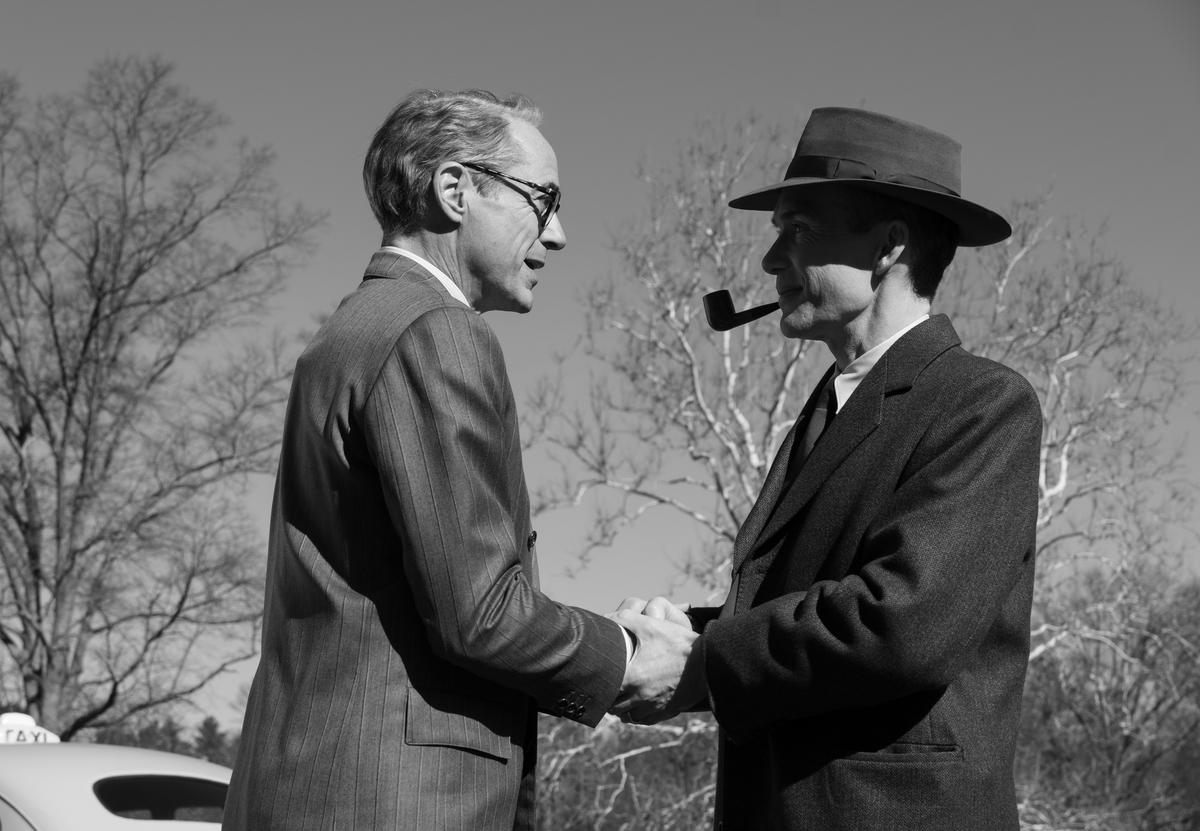More than just a retelling of the scientific development and implementation of nuclear weapons, Oppenheimer explores the moral and ethical quagmire associated with the concept of weapons of mass destruction by examining the man in charge of the Manhattan Project.
In the professional realm, we verify the qualities of a person by putting them under scrutiny. Tests, studies, interviews, meetings, reviews, and other means are all trial by fire. Experts in a field use their knowledge and personal preferences to determine if a newcomer has what it takes to be a contributor. Oppenheimer is a film that takes a similar approach. Rather than existing simply as a biographical study of the man in charge of the development of the first nuclear weapon, it is instead a non-stop barrage of hurdles thrown at this historical figure to try and figure out if he is in fact worthy of our admiration.
The film doesn’t concern itself too much with J. Robert Oppenheimer’s origins. It doesn’t wallow in the cold war aftermath of his decisions. The focus is during the most important time of his life – his crowning achievement and what he is best known for. It is full of senate hearings, top secret closed-door meetings, and discussions of scientific brainstorming. Through these scenes director Christopher Nolan attempts not to question Oppenheimer’s actions, but to peer into his soul.
Oppenheimer
Directed By: Christopher Nolan
Written By: Christopher Nolan
Starring: Cillian Murphy, Matt Damon, Emily Blunt, Robert Downey Jr., Florence Pugh
Release Date: July 21, 2023
As time progresses he faces greater and greater challenges, each an opportunity to perhaps judge character or conviction. We have our own preconceived notions of his accomplishments, but Nolan does his best to position his microscope under contemporary context. Today we already know how Oppenheimer’s work changed the world. At that time it was only conjecture. They had to consider the very best and very worst possible outcomes. In the thick of it, Oppenheimer and his team knew these scenarios better than anyone else, and they carried this burden. Desperation and paranoia set in the deeper they go. Worst of all, they can’t stop. The fate of the world hangs in balance, billions of lives born and unborn are at stake.

Nolan frames the scientific challenges as the relatively easy ones to overcome in comparison with the moral quandaries they inevitably lead to. Early on Oppenheimer explains quantum physics as existing in a paradox, and indeed we see this observation play out in the real world. Initially questions of whether the math will work out make way for deeper philosophical conundrums. These are scientists, and they have the knowledge and experience to handle the science, but not necessarily the politics that comes along with the scientific breakthroughs. Oppenheimer’s most challenging moments are personal crises – saying goodbye to a lover, deciding to relinquish his child, defending his friendships – more so than professional.
Through trial-by-fire, Nolan helps us understand who Oppenheimer is and what he is up against. For most people he is defined in the general sense by one crowning achievement, but he lived very much in the shadow of it. As a scientist he was never really a pioneer, and as project director he was never able to make the biggest decisions. He sought out the insight of his peers and mentors to help make the most difficult decisions. He helped decide where an atomic bomb should be used, but was never capable of dictating when and how. If anything, Oppenheimer’s strength lies in his ability to mediate. In the realm of quantum physics he was the fulcrum point between impossibility and practicality.
As all project managers are familiar, the job is one of balancing stakeholder expectations. Nolan represents these stakeholders with a large ensemble cast. Some are recurring, some only present for a scene or two. Oppenheimer is ultimately at the mercy of the US Government (represented by characters portrayed primarily by Matt Damon and Dane Dehaan), but they are essentially clueless about the science. Oppenheimer’s scientists (primarily Josh Hartnett, Benny Safdie) are in full control of their realm, but disagree about implementation. Hovering above all of them is the court of public opinion (which in the later years of the film is attempting to be controlled by Robert Downey Jr.’s bitter portrayal of Lewis Strauss), and the needs of international security (helmed by campaigns of characters portrayed by Casey Affleck and Jason Clarke).

Oppenheimer paints a picture of a complicated web of truths, suspicions, and personal vendettas all passing through one J. Robert Oppenheimer. At times we feel sorry for him, at times we question his stubbornness and selfishness. There are broad strokes to reflect upon as much as there is a scattering of minutiae to obsess over. This is not a film you can truly comprehend in just one sitting. Nolan’s script is complicated, detail-laiden, and fast paced when it needs to be. The film churns through time breathlessly, jumping forward and backwards in history with such ease and comfort as only Christopher Nolan can. It is definitely tedious but that just adds to the immense thematic weight.
Still, the film is much more than just a stream of fast-moving dialogue interspersed with the montages of scientific breakthrough. Oppenheimer excels by involving the audience’s senses. Nolan chooses to portray scientific concepts and the atomic explosion itself with the contrast of bright intensity and irritating vibratory noises. The first successful test is shot in the pitch black night in haunting silence with the orange-yellow energy almost a beacon of beauty to illustrate the achievement – and then comes the noise and pressure demonstrating the terrible implications. The score follows suit, walking the razor’s edge between haunting and inspirational. Nolan also uses a few innovative narrative tricks to demonstrate the emotional struggles of Oppenheimer, allowing audiences a “glimpse” within his mind to further explain his torment against the outward perception of success.

Existing within this echo chamber of possibility and consequence is Cillian Murphy’s Oppenheimer. His performance is critical to the success of the film, not just because it requires depth enough for the dense narrative, but because of the way it revolves around the character entirely. The only scenes in the film without Oppenheimer in them feature characters discussing him. This speaks to the incredible focus of the production, but also of Murphy’s ability to find a sound foundation where he is able to ride out the persona’s multi-faceted controversy. In midst of the grand expectations conjured by history, Murphy finds and conveys what makes Oppenheimer a human being more than a hero.
To do this, the film doesn’t try to balance his professional accomplishments with his personal shortcomings. It doesn’t attempt to explain his inspiration or motivation, it doesn’t worship him or offer a strict criticism either. The movie is not without its controversies (in both what it includes and does not), but neither does it provide a forced perspective to smooth over the bumps. Instead, Oppenheimer works in a sort of limbo between absolutes. It mimics his work on the atomic bomb, confronting uncertainties with the best information available, but leaving the full implications unresolved. It leaves room for discussion, differing interpretation, and the best compliment for a film I can offer; engaging re-watchability.

